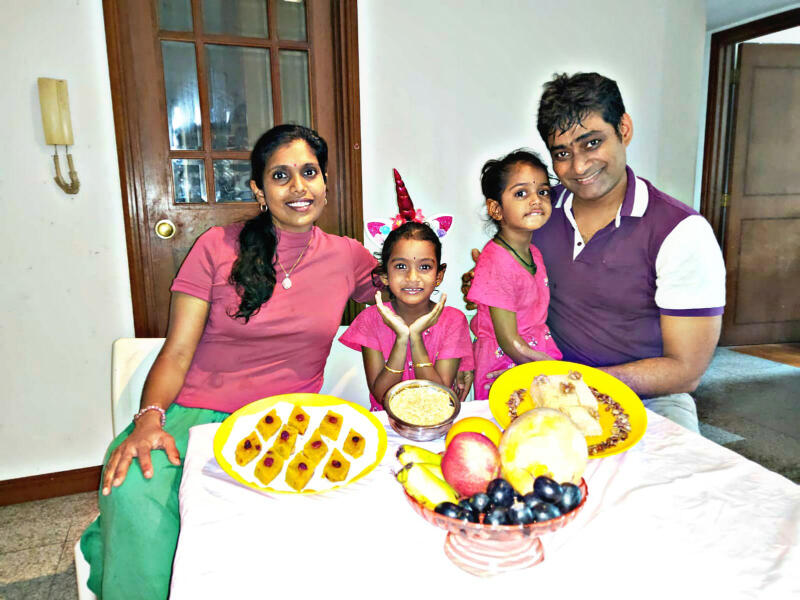Tamil New Year a muted but meaningful affair in Singapore
Sign up now: Get ST's newsletters delivered to your inbox

Ms Veenaa Subramaniam was grateful she could enjoy a nice meal with her husband and two young children at home.
PHOTO: VEENA SUBRAMANIAM
Follow topic:
SINGAPORE - Tamil New Year celebrations on Tuesday (April 14) were muted affairs as the South Asian community complied with measures to break the transmission of Covid-19.
Traditional visits to temples and large gatherings of family and friends were out, replaced by quiet meals and prayers at home with immediate family members. Greetings were exchanged on social media.
These changes were necessary as all places of worship are closed until May 4 and social gatherings banned as part of social distancing measures.
Ms Veenaa Subramaniam, 37, noted: "It's usually a big community affair because all of us will wear our traditional clothes and greet each other at the temple in the morning. This year, we just wore our house clothes and prayed at home."
The customary potluck by the pool with the other "condo aunties", where they would share dishes, was also on hold this year but she was grateful she could enjoy a nice meal with her husband and two young children at home, Ms Veenaa said.
Celebrations for local actress Eswari Gunasagar, 30, were "very, very different" this year. Previously, she and her family would visit Little India on the Tamil New Year's Eve to buy items such as garlands to prepare for prayers, but they avoided the area this time around.
Her elder siblings, who are married and have moved out of the house, could not join her and her parents to celebrate as a group, either. "Though we are thankful for technology, because we can call one another, celebrations are never celebrations without the physical presence of your loved ones," she said as she made wishes for the pandemic to be over soon.
The Tamil New Year, or Puthandu, falls on the first day of the Tamil calendar and is usually celebrated by Hindu families.
Other South Asian communities in Singapore ring in the new year using similar calendars. The Sikh community observed Vaisakhi on Monday, while the Malayalee and Bengali communities observe Vishu and Pohela Baishakh respectively on Tuesday.
Manpower Minister Josephine Teo and Communications and Information Minister S. Iswaran extended new year greetings to foreign workers via a video. They thanked workers for their contributions to Singapore's development and reassured them that their healthcare needs and other concerns, such as wages and Wi-Fi connectivity in their accommodation, will be taken care of.
Mrs Teo said: "The Covid-19 outbreak has affected all of us, but I know it is especially hard for you... On behalf of all Singaporeans, I wish you good health in the new year. Stay safe for your families, stay safe for your friends."
Meanwhile, the inter-agency task force teamed up with the Hindu Endowments Board to distribute festive goodies to help foreign workers ring in the new year. A bumper collection of 123,000 Indian sweets, such as laddu and paal gova, were prepared by 24 Hindu temples and distributed to foreign workers across 22 locations islandwide.
Indian national Veeramuthu Veerajeeva, 43, who works as a facilities supervisor, told The Straits Times that the festival was a lonely affair this year as he could only pray in his dormitory room and not head out to meet his friends.
But Mr Veeramuthu, who is also a Migrant Workers' Centre ambassador, remains positive: "There will always be good and bad in life. Right now, life is a bit difficult, but that means that it will be good in the future. It's a new year, and that means that good things are coming."

